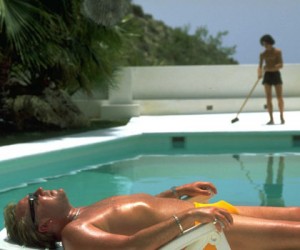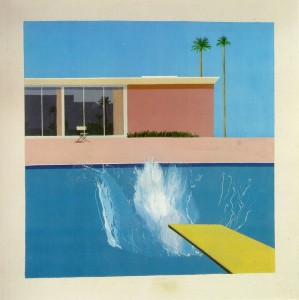Sexy Beast, 2000. Directed by Jonathan Glazer.

Gal Dove relaxes in "Sexy Beast"
“Sexy Beast” opens on a scene of simple, Hockney-like geometry. A square pool. A horizontal white plinth of lounge chair. A male body, roughly rectangular. Many shades of blue. The establishing shot marvels at a near-African sun.
Two overlapping pink hearts, candy-shaped, feature in mosaic at the bottom of the perfect blue pool. These are the kind of hearts that, like tiki torches and umbrella-laden drinks, suddenly look agreeable, even touching, and so deeply right in a tropical setting. Totally tasteless and totally sincere. No impoverished labourers created that mosaic, no: those hearts are made of pure love.
The body looks edible, tenderized, like a slab of medium-rare steak. The slicked-back hair is a glorious honey blond, striped with white. The body is doughy and middle-aged but still lushly beautiful, tanned the ridiculous mahogany of vacationing Englishmen. It is covered only with tiny yellow Speedo briefs. The body can barely rouse itself to deliver a rapturous monologue on its pleasures.
Sun, semi-nudity, solitude. It’s all right there on the surface. A vision of calming hedonism, of gorgeousness in exile on the Costa del Sol. The souped-up reggae of “Peaches” by the Stranglers is a perfect, cheerily insinuating soundtrack.
Gal Dove (Ray Winstone), retired Cockney gang member and burglar, is enjoying an eternal poolside junket in a world without melanoma. Reflecting on a former life in England, he mutters: “It’s a dump. Don’t make me laugh. What a toilet.”
Gal clambers up from his white sun bed to appreciate his existence from a rare perspective of verticality. Suddenly, a massive boulder rolls without explanation down a nearby hill, just clears Gal’s shoulder, and crashes into the perfect square pool, filling it almost completely and breaking the two hearts.
It feels all very Aesop’s Fables, somehow.

David Hockney, "A Bigger Splash". 1967. London, Tate Gallery.
That night, news arrives of the immanent descent of criminal middleman Don Logan from London to this Spanish paradise. Gal lives with his beloved wife, former porn actress DeeDee, and two close friends from London, Aitch and Jackie. All wilt with fear at the mention of Logan’s name; his arrival for an overnight visit brings new meaning to the term home invasion.
Logan is played by Ben Kingsley, best known in the title role of Richard Attenborough’s “Gandhi”. Both the casting and the performance are shocking, and here Kingsley brilliantly and easily earns his Oscar nomination for Best Supporting Actor.
Logan turns out to be a swami of ultra-violence, as spare as a shark: a rage-machine in a short-sleeved dress shirt and cheap flannel trousers. His bony, bumpy head, as he sits rigid in the back of a taxi, is bald, still. He is given to paranoid dialogues with the mirror in the dead of night, winding himself up until he literally kicks Gal out of bed. His speech is disturbingly speedy, and he has the habit of repeating the pigtails of sentences with brawling disbelief.
Previous collaborations with Logan in high-line robbery have already earned Gal nine years in prison. Logan, himself under pressure from crime boss Teddy Bass (Ian McShane), has come to recruit the unwilling Gal to empty the safety deposit boxes of a London bank, whose vault is billed as one of the most inaccessible in Europe. (The planned entry is fittingly swank: eight thugs will tunnel through the pool of a Turkish bath adjacent to the bank, creating an underwater ballet of snorkelling and welding gear.)
Gal’s clean, spacious hacienda is instantly infused with claustrophobic tension and the atmosphere of domestic violence. Logan’s momentary kindness (shot through with homoerotic yearning, as in his confession to Gal: “I love you. You are loveable. Big loveable bloke”) only wrong-foot the audience, making the next assault sting all the more. “Dove the love,” rhapsodizes Logan. “Glamorous Gal, big Gal. Gorgeous. You used to have a great body, great physique. Handsome.” Logan pivots to invoke DeeDee’s resume of old super-16 porn films: “Dear me. What a stain on your life. All the Persil in the world couldn’t shift it. She’s disgusting.”
Don Logan won’t take no for an answer. “Yes! Yes, yes, yes, yes, yes, yes,” he screams. Kingsley unleashes the black comedy in Logan’s rage by playing him deadpan, implying Logan’s ratty cunning, not Kingsley’s irony.
Gal is a bullyboy no longer. He is touchingly devoted to his marriage and the simple pleasures of lounge lizardry. He acts as a father-figure to the local pool-boy. Appraising Gal’s beefy, sun-blackened body, Logan hilariously spits out: “You should be ashamed of yourself. You look like fucking Idi Amin.”
Power is exerted through the criminal chain of command through sexual bullying. Teddy Bass is offered a crack at the bank’s vaults by a suavely nude bank president at an orgy they both attend. Logan veers with terrifying arbitrariness from spasms of homophobia to hints at inconceivable violence. “That can all change,” he threatens Jackie, remarking on her beauty. “You’ve got very nice eyes, DeeDee. Never noticed them before. They real?”
Prior to Don’s arrival, Gal and Aitch take the pool-boy shooting, and comically fail to bring down the tiny bunny in their sites. Soon come dreams and hallucinations to haunt Gal featuring a giant, homicidal man-rabbit. Staged by debut film director Jonathan Glazer, these arty interludes have proven virtually impossible for critics to assimilate, though they are as successful as they are ambitious. Imagine Matthew Barney splicing the Manx iconography of “Cremaster 4” into a hybrid psychodrama-gangster film. The gun-wielding man-rabbit appears to signify both Don Logan, and then Teddy Bass, but it is most terrifying when it detaches from its signified altogether.
Glazer finds a textured ensemble piece in a gangster film, and employs photography of exquisite quality. His keen formalist instinct enables him to subtly refract audio-visual effect through Gal’s first rapturous, later panicky perspective. The verbal duels of Gal and Don are as captivating as a shoot-out, elevating what might have been a genre film to the status of art.
Tags: Ben Kingsley, David Hockney, Ian McShane, Jonathan Glazer, Ray Winstone, Sexy Beast, Spain, The Stranglers
Your post Big Trouble in Paradise was very interesting. I have your blog now in my bookmarks and I visit your blog again, soon. Take care.
I have always thought of Sexy Beast, one of my all time favs, as primarily a love story: Oh, for the pure love of Gal and DeDee (“Dee . . . I don’t know what like I love ya”) in comparison with the pure evil of Don Logan. I will admit, in weak moments, that I think it is looser in the middle than it could have been, but still I watch it over and over again, and I am never terribly disappointed. Your review is very evocative of the film; I enjoyed it very much.